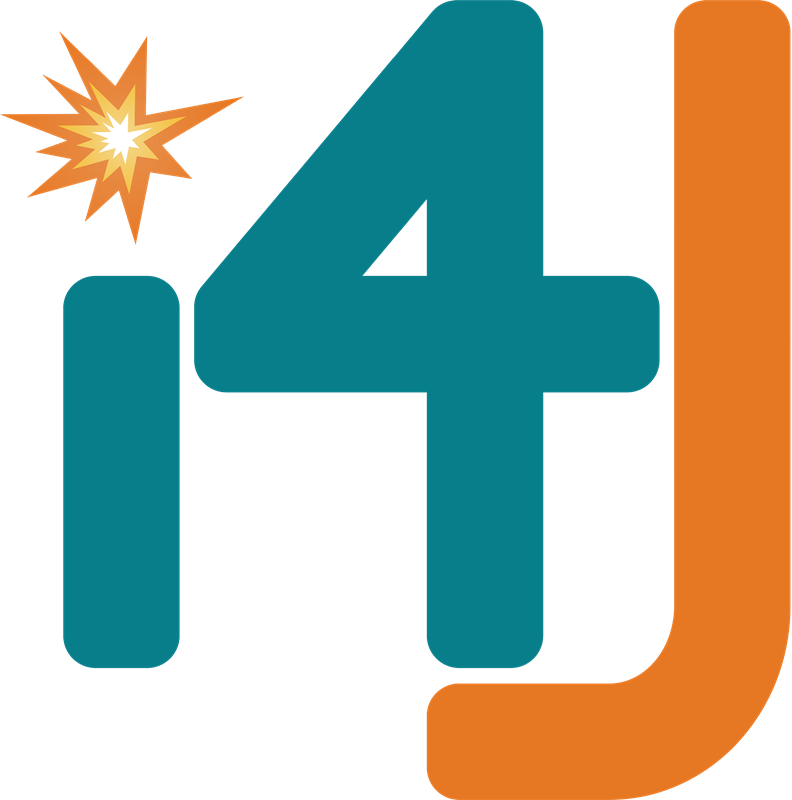DV organizations provide a wide range of services to survivors. DV organizations vary in the services they provide to survivors.
Domestic violence organizations provide a wide range of services to domestic violence survivors. In this research, the participating organizations reported an average of 16.62 service types, including:
- Hotlines
- Documentation
- Crisis Counseling/Crisis Intervention
- Lethality/Risk Assessment
- Referrals to Other Social Service Providers
- Safety Planning
- Strengths Mapping
- Education about Domestic Violence and Relationships
- Victim’s Rights Education
- Assistance with Housing
- Counseling
- Help with Protection Orders
- Help with Parenting Plans
- Help with Child Support
- Explain how to File Court Documents
- Explain what Information Survivors Need to Give to the Court
- Connect Survivors to Free Legal Help like Legal Aid or Pro Bono Services
- Attend Court Hearings
- Debrief with Survivors after Court
- Community Outreach
- Other Services
Other Services include: Support Groups, Non-profit Management, Assistance with Divorce, Transportation, Assistance in Family Matters, Emergency SART/DART Dispatch, DV Education to Other Providers, Community Partnership, Assistance to Caregivers through Forensic Interviews, Provide Clothing/Furniture Vouchers, Emergency Shelter, Trauma-Focusing Counseling, Interpretation, Community Referrals, Mitigation Assistance for Criminalized Survivors
Services Provided to Domestic Violence Survivors
112 advocates indicated whether their organization provided these services. This graph illustrates the percentage of advocates that provide these services.
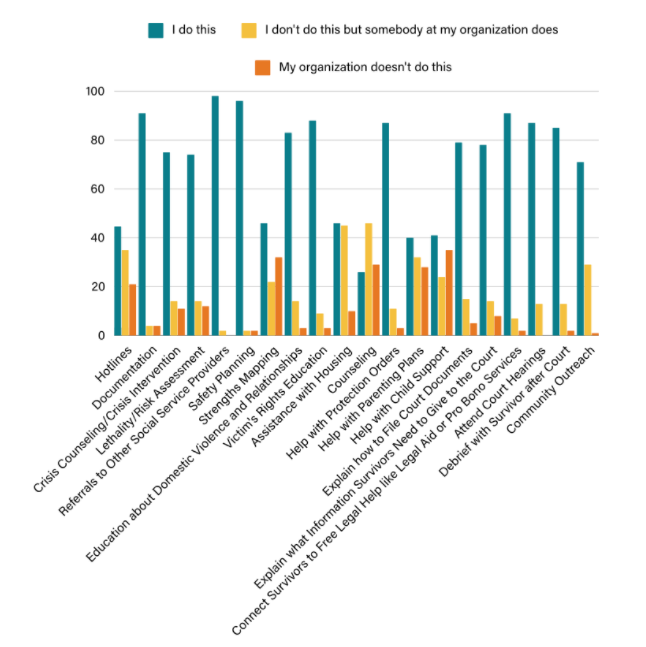
Number of Organizations that Provide Services to Domestic Violence Survivors
79 organization leaders indicated whether their organization provided these services. This graph illustrates the percentage of organizations that provide these services.
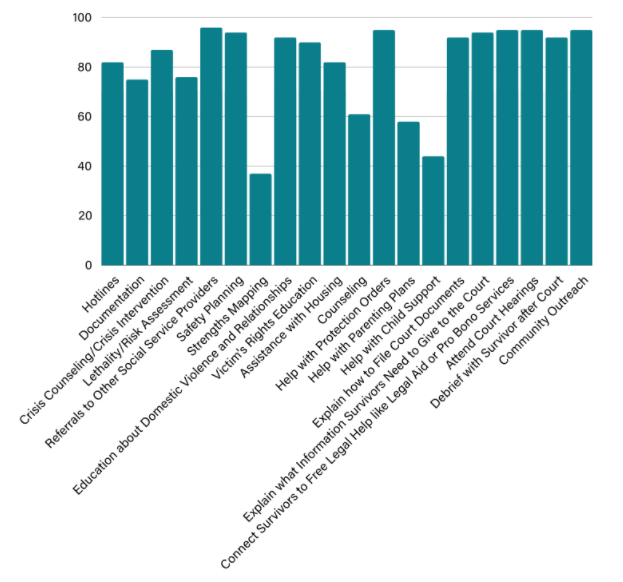
In 34 states, DV advocates must refer survivors to other service providers because they cannot provide legal advice to survivors, which creates a service gap for survivors with legal needs. 16 states have begun to address this service barrier with UPL exceptions that permit DV advocates to offer some legal help to survivors.
A thorough search of exceptions to UPL restrictions revealed 10 states that allow DV advocates to provide legal assistance to survivors (Alaska, Arizona, Illinois, Iowa, Michigan, Nebraska, Nevada, North Dakota, Utah, and Washington) and 6 states that allow Allied Legal Professionals (ALPs) (professionals who are not licensed attorneys who serve clients and complement and enhance legal services provided by attorneys) to assist survivors with legal issues (Arizona, Colorado, New Hampshire, Oregon, Utah, and Washington). The contours of UPL exceptions differ from state to state; visit the UPL Database for more details about these different exceptions. Surveyed advocates were asked whether they were authorized to provide legal advice to survivors; 93.7% of advocates indicated they are not authorized to provide legal advice to survivors. Only one advocate that indicated they were authorized to provide legal advice to survivors practices in one of these identified states. This may indicate confusion by the question or lack of clarity of what advocates may assist survivors with when presented with a civil legal issue.
Jurisdictions with DV UPL Exceptions
| Jurisdiction | Who is authorized? | What is authorized |
|---|---|---|
| Alaska | Community Justice Workers | 1) provide legal advice; 2) provide legal information; 3) draft legal documents; 4) advocate for survivors in proceedings |
| Arizona | Domestic Violence Legal Advocates/ Allied Legal Professionals | DVLAs may 1) provide legal information regarding orders of protection; 2) provide legal advice regarding court forms and filing; 3) provide legal advice regarding preparing for hearings; sit at counsel table to quietly advise; 5) respond to questions from judge; Allied Legal Professionals may 1) prepare and sign legal documents; 2) provide legal advice; 3) draft and file court documents; 4) appear in court; 5) negotiate legal rights |
| Colorado | Allied Legal Professionals | 1) assist in choosing court forms; 2) assist in completing court forms; 3) explain and file court forms and documents; 4) negotiate with opposing party; 5) complete and file settlement agreements; 6) communicate with opposing party; 7) explain court orders; 8) sit at counsel table to advise; 9) make arguments and statements; 10) respond to questions from judge; 11) provide information regarding requirements from the court |
| Illinois | DV Advocates | 1) sit at counsel table and confer with survivor; 2) assist in preparation of petitions for orders of protection |
| Iowa | DV Advocates | 1) distribute self-represented litigant forms; 2) describe proceedings to survivor; 3) assist survivor as witness; 4) accompany survivor throughout all proceedings; 5) sit at counsel table and confer with survivor; 6) address the court at judge’s discretion |
| Michigan | DV Advocates | 1) assist in obtaining, serving, modifying protection orders; 2) provide an interpreter; 3) inform survivor of available resources |
| Nebraska | DV Advocates | 1) distribute self-represented litigant forms; 2) describe proceedings to survivors; 3) accompany survivors to proceedings; 4) sit at counsel table and confer with survivor; 5) respond to questions from judge |
| Nevada | DV Advocates | 1) provide emotional support for survivor; 2) assist survivor feel safe during court proceedings; 3) be close to survivors in court |
| New Hampshire | Allied Legal Professionals | 1) draft court documents and pleadings; 2) represent survivors in specific courts |
| North Dakota | DV Advocates | 1) assist in completing court forms; 2) sit with survivor in court proceedings |
| Oregon | Allied Legal Professionals | 1) advise regarding legal steps to be taken to achieve goals; 2) assist in completing court forms and drafting pleadings; 3) file court documents; 4) assist with completing discovery; 5) attend depositions; 6) represent in settlement proceedings; 7) advise on options at judicial settlement conferences; 8) assist in preparing for hearings and trials; 9) provide support in hearings; 10) explain court orders and notices |
| Utah | Sandbox Authorized Entities/ Allied Legal Professionals | Depends on specific entity’s authorization – For example, CAPP advocates may 1) provide legal information; 2) provide legal process assistance; 3) assist in completing court forms; 4) provide legal advice regarding completing court forms and court presentation; Allied Legal Professionals may 1) assist in completing court forms; 2) assist in choosing court forms; 3) file and serve court forms; 4) explain court documents; 5) file court documents; 6) negotiate and advocate on behalf of survivor in settlement agreement; 7) communicate with opposing party; 8) explain court orders; 9) sit a counsel table to provide support and answer questions from the judge |
| Washington | DV Advocates/ Allied Legal Professionals (Program Sunset – no new training) | Advocates may 1) assist in completing court forms for protection against domestic violence; Allied Legal Professionals may 1) explain legal relevancy of facts; 2) explain court procedures and which documents need to be filed; 3) assist in filing and serving court documents; 4) provide self-help materials that include legal requirements; 5) explain court documents; 6) assist in choosing and completing court forms; 7) perform legal research; 8) communicate and negotiate with opposing party |
For more details about these exceptions to UPL restrictions across the country, see the UPL Database.
Some exceptions to the prohibitions against DV advocates providing legal advice exist. Organizations in Arizona, Utah, and Alaska are authorized to provide limited-scope legal advice to DV survivors. These community-based justice worker initiatives, which “involve training and certifying individuals working at community-based organizations to offer legal advice and services in certain case types.” include the Domestic Violence Legal Advocates in Arizona, the Timpanogos Legal Center Certified Advocate Partners Program in Utah, and the Community Justice Workers under the supervision of Alaska Legal Services Corporation attorneys in Alaska.
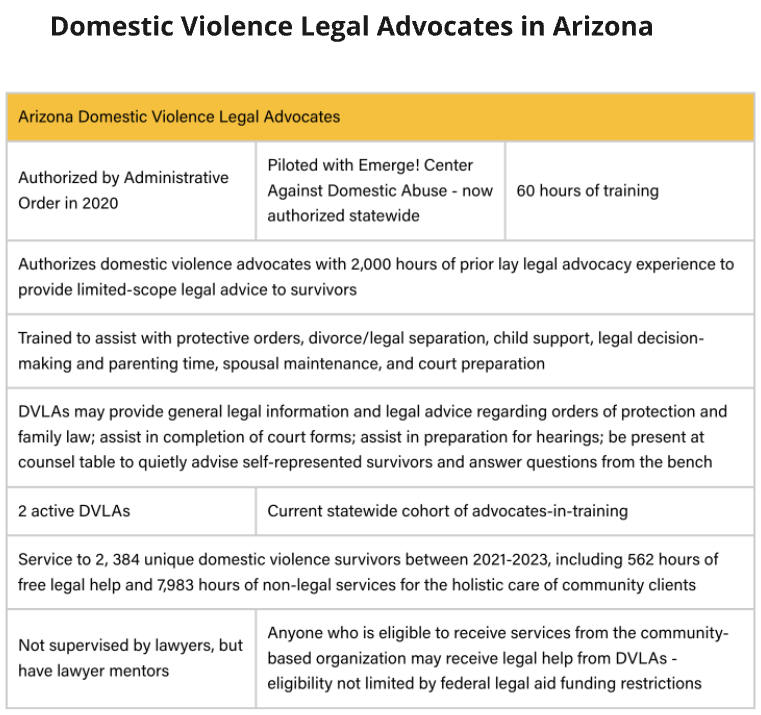
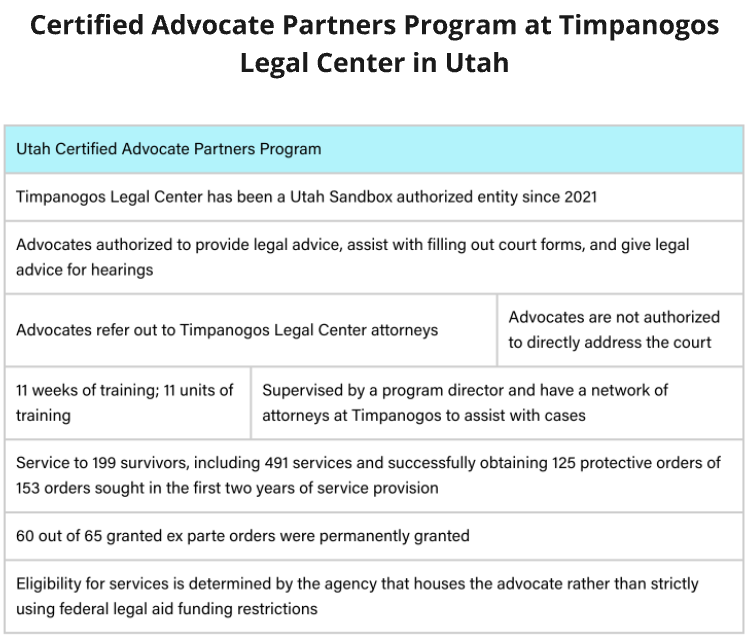
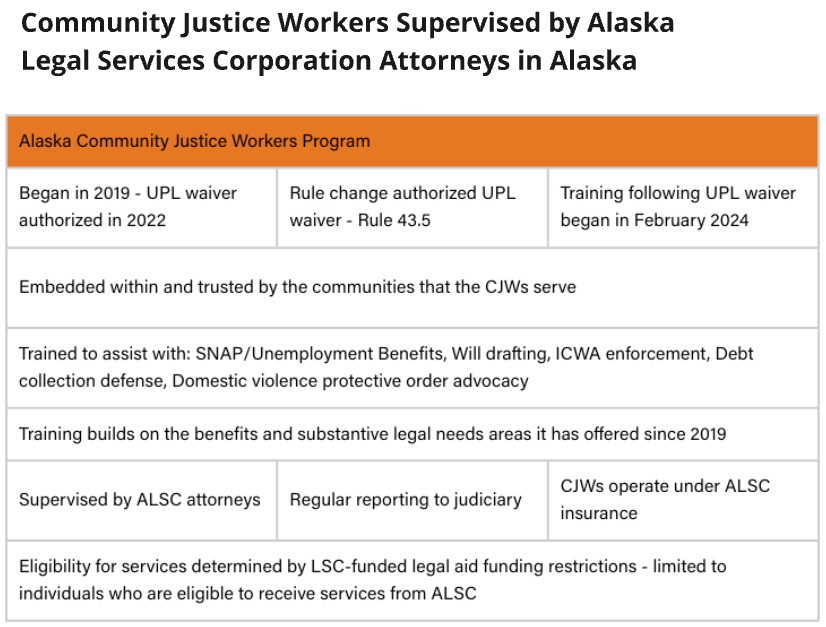
Allied Legal Professional Programs across the country
Several states have begun implementing allied legal professional programs, which to the extent they include family law services can benefit survivors who have the ability to pay for legal help. States that have implemented these programs include Arizona, Colorado, Minnesota, New Hampshire, Oregon, and Washington. Of these, New Hampshire is an example of a jurisdiction that has specifically targeted DV services by licensing paralegals to provide legal assistance to domestic violence survivors in three jurisdictions throughout the state–Franklin, Berlin, and Manchester. The qualifications for this licensure are a bachelor’s degree in any field or an associate’s degree in a law-related field and two years of experience working under a licensed attorney in good standing in the jurisdiction. Training varies from agency to agency; there is not set protocol for training paralegals to provide limited-scope legal advice to survivors. This paralegal program provides services to individuals whose household income is significantly higher than the legal aid threshold–300% of the federal poverty threshold. Since January 1, 2023, two paralegals at one organization have served 15 survivors and have obtained 15 temporary protective orders. This program has allowed attorneys to assist more individuals with increasingly complex problems because the paralegals are successfully assisting survivors with protective orders. While this program is scheduled to sunset at the end of 2024, there is a bill pending in the state legislature that would extend the length of the pilot for approximately five years and expand this initiative to all circuit and family courts in the state beyond the three currently authorized.
DV Organizations face many challenges when they try to help survivors experiencing legal problems.
Click the drop-downs on each challenge to see what organization leaders had to say about these challenges.
Lack of Funding/Resources
“Inadequate funding to meet the need would be the number one challenge.”
– Organization Leader from the Northwest
“[T]he family doesn’t have the economic resources to pay for minimal things.”
– Organization Leader from the Southwest
“Oftentimes, the abuser has money and means to hire private counsel, which is very intimidating for our clients.”
– Organization Leader from the South
Litigation Violence
“[C]oercive behaviors have absolutely been wielded throughout the court process.”
– Organization Leader from the Northeast
“They [attorneys] don’t have the lens when they’re looking at legal strategy of how to…work from a place in space of assessing for power and control and assessing for tactics of, you know, really let…litigation enforce…behavior.”
– Organization Leader from the Northeast
“I’m thinking of…a couple of examples of how abusers have taken the survivors to…civil court for frivolous lawsuits.”
– Organization Leader from the Midwest
“[T]he system has been manipulated by this individual using abusive behaviors.”
– Organization Leader from the Northeast
Finding Lawyers/Representation
“I think we don’t have enough attorneys.”
– Organization Leader from the Northeast
“It’s a lot of a kind of red tape issues that…really prevent us from getting as many attorneys to volunteer their time with us as we could.”
– Organization Leader from the South
“The lack of affordable legal representation…it’s a huge barrier here.”
– Organization Leader from the Midwest
“[The biggest challenge is] a lack of staff in order to provide that in court representation.”
– Organization Leader from the South
Capacity
“The cases are lasting years, you know, five years, which makes it very hard to take on new clients.”
– Organization Leader from the Midwest
“If we’re short staffed, it’s really hard to keep up with everything.”
– Organization Leader from the Northeast
“One advocate…with a case load of 25 people, it’s a lot, you know…and people are gonna keep coming.”
– Organization Leader from the Midwest
“Our biggest challenge is not being able to help on every single case and issue and there in person.”
– Organization Leader from the South
Logistical Issues
“The other obstacle that I think is across the board is just the way that the whole procedure is handled.”
– Organization Leader from the South
“You’re seeing such a large gap in socio-economic statuses, and in those communities that have the higher socio-economic status, there isn’t as much assistance or communication or teamwork with local law enforcement when it comes to DV.”
– Organization Leader from the Northeast
“[You] have to be able to have a mode of communication that is reliable, which is really difficult here as well, because…there’s swaths of this region with zero cell service, zero Wi-Fi.”
– Organization Leader from the Midwest
“So survivors of domestic violence have to come into those cases with [documentation] whether it be police reports or flat orders of protection or something like that. And we know that many survivors of domestic violence do not have that kind of evidence to support what they have gone through.”
– Organization Leader from the Midwest
The Court System
“But the court itself in general has a complete disregard for safety risk and lethality.”
– Organization Leader from the Northeast
“I don’t hear about it as much as I used to. But judges who are not aware or savvy up to the dynamics of domestic violence are an issue.”
– Organization Leader from the Midwest
“[There are] also judges [who do] not understand[] the role of an advocate.”
– Organization Leader from the Midwest
“Police officers are not educated enough to help us to make things easier for our victims.”
– Organization Leader from the Southwest
Lack of Training/Understanding
“I’m like, your [attorney] legal strategy does not consider safety risk and lethality. And to me, that is completely egregious.”
– Organization Leader from the Northeast
“I think it’s worthy of noting is the incessant victim blaming dynamics, the way that the systems are structured to, you know, almost want a victim to be perfect before they’ll accept a responsibility to actually help a victim.”
– Organization Leader from the Northeast
“I’ve had some dealings with them that they just do not either understand criminal law, or they don’t even bother.”
– Organization Leader from the Northwest
“I have very few attorneys in…[my state] that I’ve worked with or engaged with, that have the lens of understanding how an abusive person can wield legal systems as one more tactic of control.”
– Organization Leader from the Northeast
Service Provider Limitations
“[There are] definitely gaps in services and really limited resources.”
– Organization Leader from the Northwest
“The main challenge is just we can’t take those divorces or custody cases.”
– Organization Leader from the South
“We can’t even a lot of times, we can’t even take all the orders or protections.”
– Organization Leader from the South
“You’ve seen this so many times, and you feel really familiar with it, you’re still not an attorney and you still can’t give legal advice.”
– Organization Leader from the Northwest
In the current landscape, 92% of low-income survivors do not get legal help from lawyers. However, when a lawyer is available, advocates perceive their role as adjacent to and supportive of the attorney role.
What is the advocate’s role?
Advocates use a survivor-led model, in which they explore options with the survivor so the survivor can make informed decisions.
“[Advocates] explor[e] the options with [the] survivor and then articulate that for their attorney.”
– Subject Matter Expert from the Northwest
“[Advocates are] there to provide help needed as defined by the individual seeking help.”
– Subject Matter Expert from the Midwest
“[An advocate is] arming [a survivor] with the information, the knowledge and the resources and supporting them so that they’re able to take the action that they choose.”
– Subject Matter Expert from the Midwest
“[Advocates] empower victims survivors.”
– Subject Matter Expert from the Midwest
Advocates provide direct services to survivors.
“[Advocates provide] actua[l] day to day interaction with survivors.”
– Subject Matter Expert from the Midwest and Northeast
“[Advocates are] doing all the direct service.”
– Subject Matter Expert from the Midwest and Northeast
“[Advocates are] individuals who are doing what they can to help [survivors]”
– Subject Matter Expert from the Midwest
Advocates provide a listening ear, resources, and support survivors with nonlegal needs.
“[Advocates provide] emotional support and encouragement.”
– Subject Matter Expert from the South
“[The advocates is] addressing the non-legal needs, and [the attorney] is addressing the legal needs.”
– Subject Matter Expert from the South
“The advocate has a little more room to focus on things outside of the legal system.”
– Subject Matter Expert from the Northeast
“Advocates address all the secondary issues that attorneys identify but don’t have the capacity to handle.”
– Subject Matter Expert from the West
“[The advocate can] just spend a little more time processing things and talking through…what it is that’s really bothering my client.”
– Subject Matter Expert from the Midwest
“[The] advocate is there for mostly the life problems as opposed to the legal problems.”
– Subject Matter Expert from the South
“[The] non-attorney [advocate] can help find resources for the survivor.”
– Subject Matter Expert from the South
“[You] see the advocate being more present with the client.”
– Subject Matter Expert from the Northwest
Advocates translate and contextualize the civil legal system and its processes for survivors.
“An advocate is there to hear what the client needs and sort of act as a translator [of the] legal system and then talk with a lawyer on the front end.”
– Subject Matter Expert from the Northwest
“[An] advocate is the entry into [the] legal system.”
– Subject Matter Expert from the South
“Advocate[s] convey the trauma story into system words that a lawyer can understand.”
– Subject Matter Expert from the Northwest
“Advocates fill in the gaps.”
– Subject Matter Expert from the West
What is the attorney’s role?
Attorneys provide possible outcomes to survivors.
“Lawyers have to provide possible outcomes.”
– Subject Matter Expert from the Northwest
“Lawyers tend to get very focused in what the case is.”
– Subject Matter Expert from the South
“An attorney…has to tell a victim both positive and negative information, like worst case, best case scenario.”
– Subject Matter Expert from the Northwest
Attorneys give legal advice, think about the survivor’s case through a legal lens, and addresses the survivor’s legal needs.
“As a lawyer, you have to have a different hat, like the way you analyze things.”
– Subject Matter Expert from the South
“[Attorneys] solve problems, legal problems.”
– Subject Matter Expert from the South
“Lawyers are able to sort of look at the fuller picture and identify a legal strategy, right, versus like a transactional piece.”
– Subject Matter Expert from the Northwest
Attorneys work with advocates on the survivor’s case, making trauma-informed care important for attorneys to implement.
“Both need the same level of understanding of trauma.”
– Subject Matter Expert from the South
“How you interact with the client is the same but the skill set is different.”
– Subject Matter Expert from the South
“Approach [the case] together and focus on your specialties.”
– Subject Matter Expert from the South
While DV advocacy organizations are sometimes able to help with common things such as protective orders, they cannot go beyond and help in more complex cases without violating UPL restrictions.
Many advocates and organization leaders indicated assisting with protective orders is a a service that their organization provides to survivors.
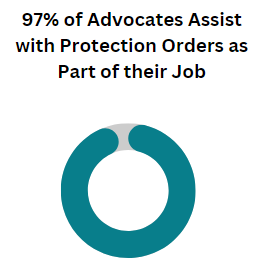
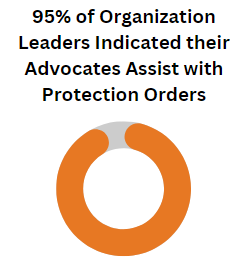
“The law doesn’t prevent us from helping individuals file a petition because we’re not operating from a legal perspective.”
– Organization Leader from the Northeast
